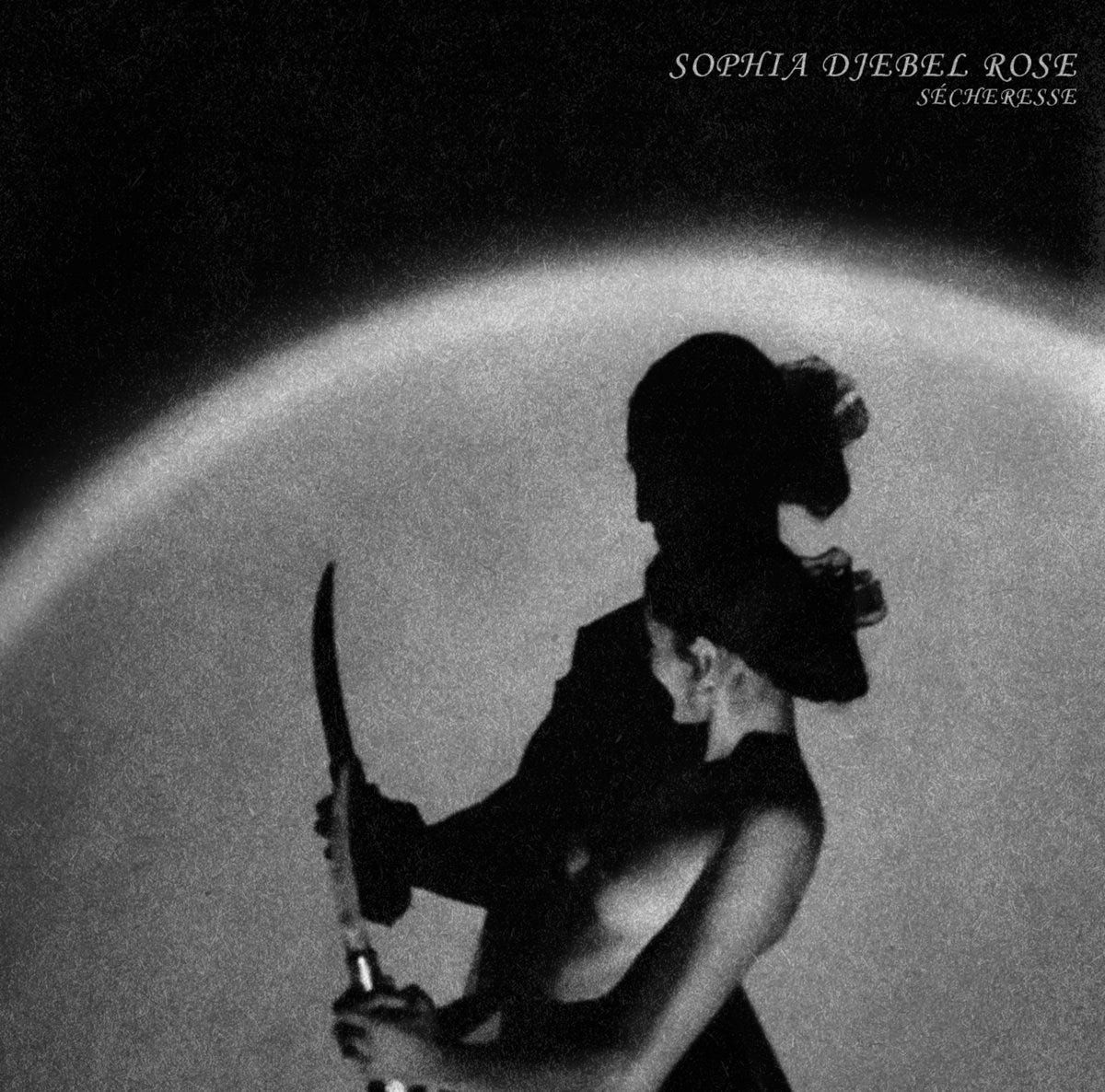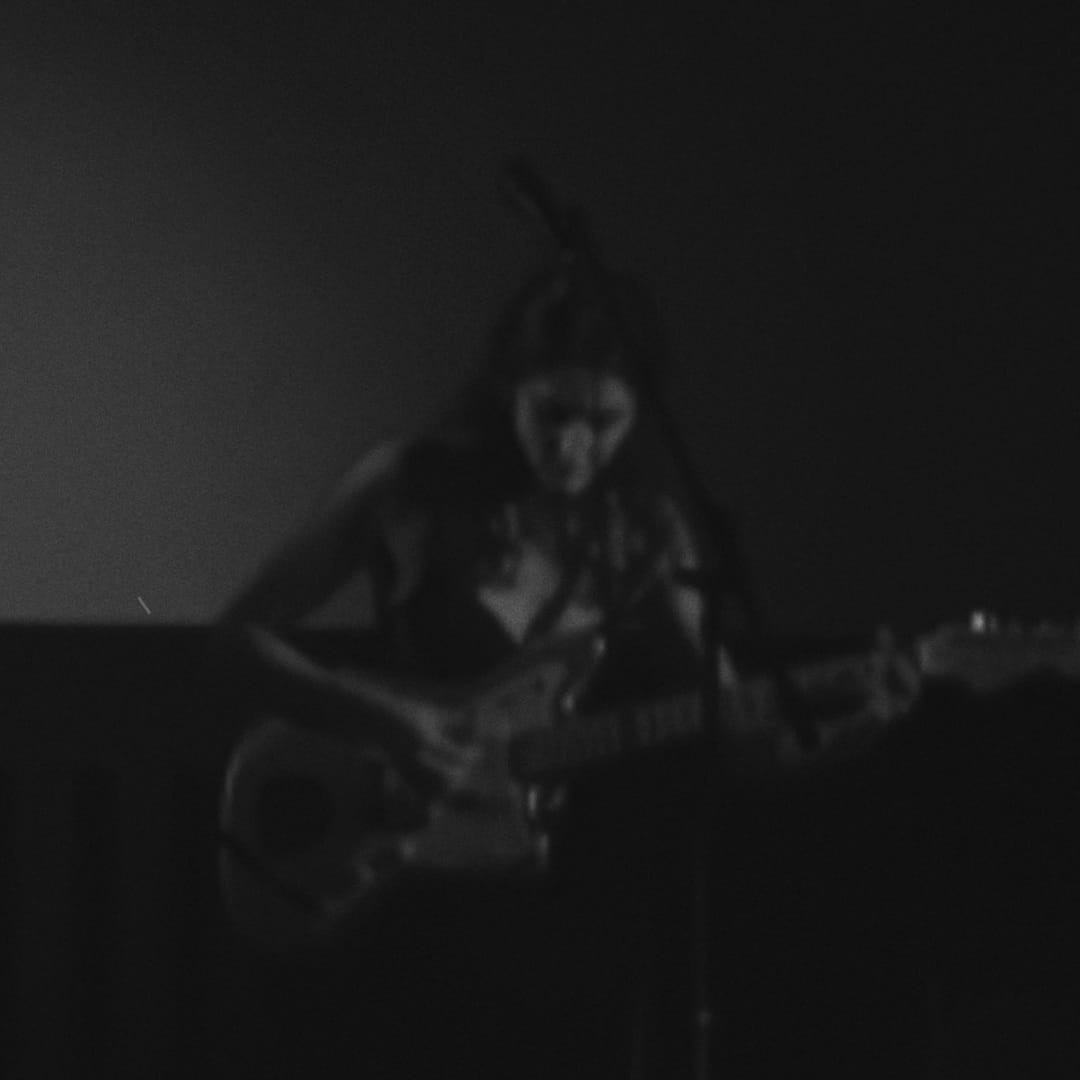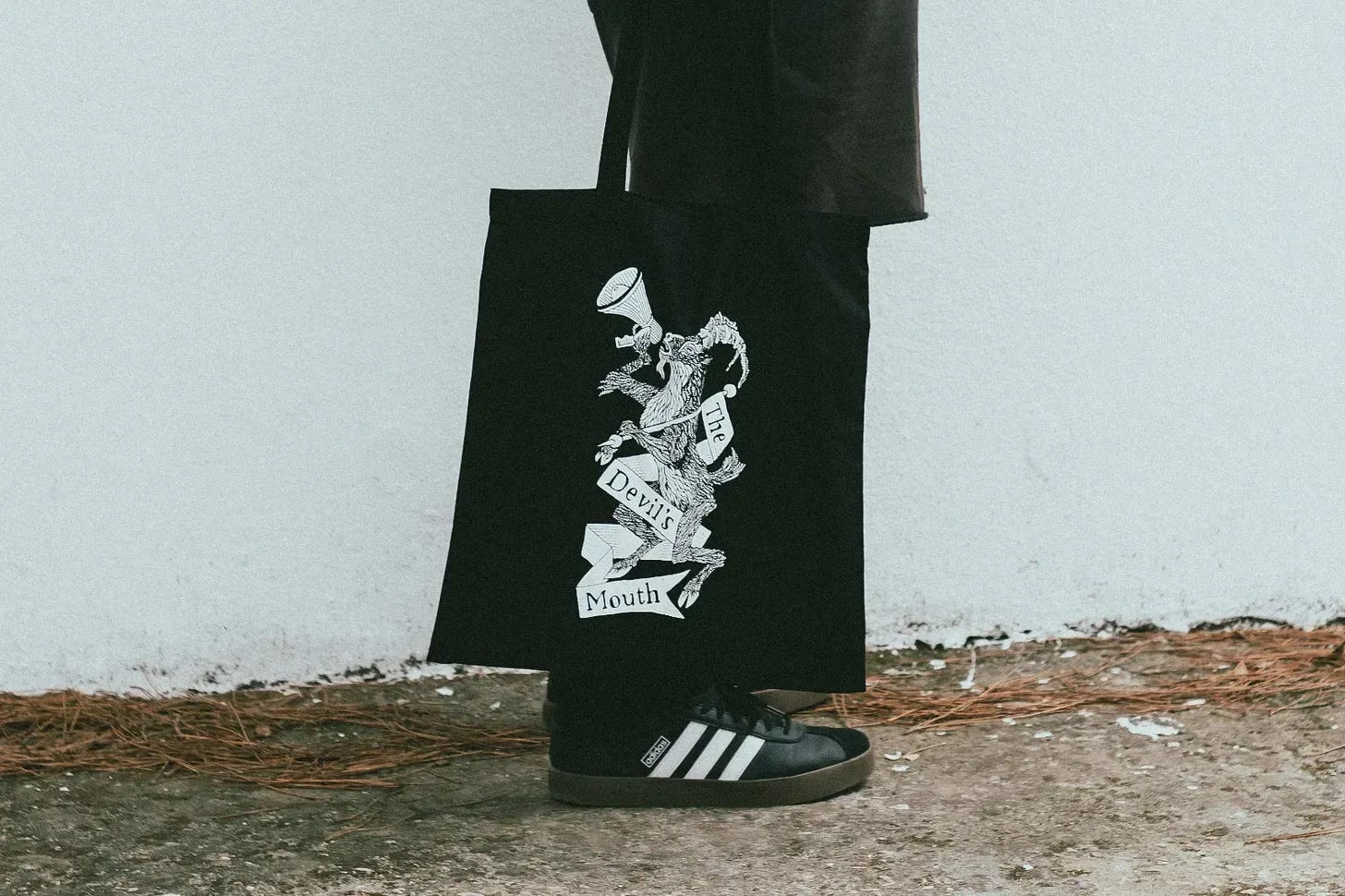Sometimes it’s really good to be shaken out of your habits. No matter how outside-the-box or uniquely whatever you want to be in the things you do, you will inevitably fall into some habits and conventions, and the more you can be slapped out of those now and then, the better. In the course of the wonderful interview with Franco-Moroccan artist Sophia Djebel Rose, that you can read in its entirety a little further down, I asked her about the “dark” side of her music. Especially when you deal with outsider/experimental/heavy/alternative/call-it-what-you-will music like I do here in this joint, “dark” will inevitably become one of your most overused words, to the point that it’s a catch-all that loses a bit of its meaning every time you use it. I mean, Black Sabbath are “dark”. So is Mayhem, or Nine Inch Nails, or Tom Waits, or some of the artists Sophia herself has been compared with (or at least paired through the infamous “for fans of” promotional shortcut), like Emma Ruth Rundle or Anna Von Hauswolff.
What does that even mean, after all? What connects these, and a million others? Is it all the same brand of “darkness”? Is it darkness at all? Sophia, disarmingly and profoundly too, answered “Today, I have the feeling that anything that isn't fun is called dark. And it's true that there's a spiritual dimension and an existential commitment in what I do. Music is not a diversion. But there is light. Rather than dark, I'd call it mindfulness or chiaroscuro. It's always a call to the light.” She is right. That alone should tell you something about the way this woman perceives and creates her music and her art. Also, I’ll be much more careful with the use of that word to describe music from now on. Now then, let’s listen to Sophia to really begin doing what we’re here to do:
That right there is the brand new video (released today!) for ‘L’homme au Costume Doré’, the first song (after a chilling spoken intro) on Sophia’s new album ‘Sécheresse’, released a month from now on February 28th. The images are remarkable adequate and further reinforce the haunting, almost cinematic quality of the song, a severe and almost minimalist tune in terms of instrumentation and arrangements, but where each phrase sung by Sophia cuts through you like a flurry of stabwounds - intense but soothing at the same time, intimidating but welcoming, like an apparition you are drawn to despite the initial fear. Like the strange tranquillity that you get at a funeral, when she sings, almost Diamanda Galás-like, “Suis-moi, où rugissent les eaux, où dorment les oiseaux”, you are pretty much ready to follow her there, or anywhere. Is it dark? Not really, not in any other sense that it is not, indeed, a barrel of laughs. It’s not “fun”. It’s mindful, it’s solemn, but it is also a call to light.
But there is more to her music still. Much more.
‘Blanche Biche’ was the first advance song off ‘Sécheresse’ to be unveiled, a bold move since it is the only song on the album not actually written by Sophia, as it is an adaptation of an old murder ballad. Obviously more elaborate, with the chanteuse in a more theatrical, storytelling kind of mood, but the immediate viscerally emotional impact remains the same. Upon its release, Sophia wrote on her social media pages that ‘Blanche Biche’ is “the story of a young Marguerite, at night transforming into a white doe, to explore the edges of the forest, finaly killed by her own brother, who that night, left on the hunt... I've spent the last few years on the road, for modestly offering the world what i beleive in, songs, love and poetry. In all these places, I went alone. Beyond forests and rivers, where feelings dazzle, raw and elementary. Beyond asphalt and violence, gas stations at night, bars and theaters... We sometimes see written on our walls #morewomenonstage, but for one hour of stage, there is one life on the edge... And this song is dedicated to all the magnificient women who live on the edge.”
It’s a remarkably strong and necessary message, and in a way it turns this song, alongside perhaps the incredibly ethereal eleven-minute title-track, into one of the main centrepieces of the album. I won’t go into too much detail about the remaining songs as they are still a few weeks away from being released, but from my lucky position of having been able to listen to the whole album, I can tell you that we are in for an absolute rollercoaster of piercing, quietly forceful examples of, as she puts it in our interview, “poetry in action.” Music that is intimate yet rebellious, fragile yet powerful. It’s about love and war, truth and dreams, a work of contrasts, a search for light in all the lightless places, a work of chiaroscuro indeed. She continues by saying that “words are weapons,” and rarely have we encountered a warrior as fierce and as meaningful as Sophia. 2025 has only just begun, and we’re already on the receiving end of one of its first major works, one that will resonate for a long time. The pre-order for ‘Sécheresse’ is available now through her Bandcamp. You know what to do.
‘Sécheresse’ is out on February 28th through WV Sorcerer Productions / Ramble Records / Oracle Records.
You can find Sophia Djebel Rose on Bandcamp, Facebook, Instagram and YouTube.
“For me there's always an urgency, an urgency to express. It's like a child who can't speak but cries out.”
- Sophia Djebel Rose
Listening to ‘Sécheresse’, I am immediately impressed by how emotionally intense the album is. Can you tell us what is at its origin, the initial inspirations and objectives for these songs?
Sophia Djebel Rose: I don't have a goal or I discover them afterwards, it's like an arrow you shoot and it goes ahead of you. It's like an astral drawing. It's only in retrospect that the meaning emerges. I work from this unconscious zone. I like to say I'm a smuggler. I open the way to clandestine emotions.
Of course, you already have a very interesting trajectory behind you. How do you think this new album evolves from your previous work, namely what you did on ‘Métempsycose’ and the initial 7”? Does it feel like braving new territory with these new songs?
Sophia: I like the way you put the question, because indeed it's all about opening up territories. I'd say that my first works were relatively peaceful, coming from an idyllic elsewhere. For they were composed in my country house, far from everything, from that immaculate place I call the child's soul, which is one-sided sweetness. The new album ‘Sécheresse’ is different, in that it was composed while I was touring. It carries a certain violence, and that violence is the violence of the world. To exist in the world is also to compromise oneself. To confront its aridity. This violence is not mine, but it was necessary to give it a voice, at least for a moment. The water of the soul must flow violently to find serenity.
You play a remarkable quantity of instruments on the album, not to mention the production, is it difficult for you to focus on so many things during the recording, or on the contrary, do you feel it’s positive for you to feel in control of everything?
Sophia: I'm self-taught and have no real technical knowledge or mastery. I use whatever I can get my hands on, and above all whatever allows an intuitive approach. The harmonium in particular and the voice, which I use like an instrument. For example, if I don't know how to play the violin, I use my voice like a string. The electric guitar, too, is very versatile and can evoke a wide range of instrumental sounds. In fact, for me there's always an urgency, an urgency to express, despite my lack of mastery and technique. It's like a child who can't speak but cries out. But it's a cry that I polish for a long time. I can't imagine doing otherwise.
How is usually your method of writing?
Sophia: I don't have a method. It's chaotic. Most of the time, the text emerges when I pick up my guitar. Then I refine it.
I think your Franco-Moroccan background is very noticeable in how these songs come across – there’s a lot of “chanson française” atmosphere on it, but your Moroccan side also comes through at the same time. Is this really a reflection of your artistic upbringing, this kind of being between two different cultures, that results in how your music sounds now?
Sophia: The influence of the Arab world may be less obvious, but it lies beneath the surface. In Islam and in Islamic art, there is this non-relation to the image. We don't represent the human being, we only conjure up motifs, curves and arabesques. In the Arab world, there is a vertigo that is the vertigo of darkness, which is also the vertigo of Music, or Psalmody. It's not about narration or representation. It's about lines that are forces in motion. And I think that is my starting point: even though there is a text, I don't write about something, but rather I use words as forces. At the end, I don't write songs about love or revolt. Rather, when I sing, I am Love or I am Revolt: because at a certain point there is no longer subject or object, only this vibration that is a manifestation in which “I” is only a vector.
There is also a noticeable dark side to your music as well, and you’ve appealed a lot to that kind of audience, the fact that some writers have compared you with Emma Ruth Rundle or Marissa Nadler really affirms that. Where does this influence come from, for you, in your opinion?
Sophia: Today, I have the feeling that anything that isn't fun is called dark. And it's true that there's a spiritual dimension and an existential commitment in what I do. Music is not a diversion. But there is light. Rather than dark, I'd call it mindfulness or chiaroscuro. It's always a call to the light.
Your bio mentions your love of poetry and how you wanted to be a writer – do you approach your song lyrics as poetry themselves?
Sophia: Yes, of course it's poetry. Poetry in action. Words are weapons. I'm thinking of a splendid poem by Léo Ferré entitled Les Armes [Weapons]. I'm also thinking of Aimé Césaire's masterpiece Les Armes Miraculeuses [Miraculous weapons].
Do you have any songs that mean a little more to you than the others on this album?
Sophia: The album is a whole, and the songs echo each other. But ‘Sécheresse’, the eponymous title track, is the keystone. The text goes something like this: “I am the woman with the white hair, and we will walk for all those who can no longer walk, and we will speak to say what others have carried beneath the earth.” It's a tribute to all those who struggled and whose names have been obliterated by history.
Then, white is the color of this song. But I think it's also the color of the album. Or rather the non-color of this album, for white is a radiance rather than a color, a dazzle, an infinite space. White is the tension between oblivion on the one hand, and the inscription of new possibilities on the blank page on the other.
How do you perceive your audience, usually, when you play live? Do you feel you get a lot of people from different scenes and backgrounds?
Sophia: For the most part, my audience corresponds to the dark and experimental scene, even if I believe that beyond all the social assignments, an encounter is always singular. We only really meet someone, an album or an artist from that place where we don't look like anyone else. Besides, even if it's more difficult, I don't stop at this scene. I play everywhere, sometimes in places that aren't really appropriate, where people don't have the musical background to contextualize my work. And so far I've refused to offer a soft set. I play the same set, with distortion, screams and feedback. In this case it happens that people don't get it at all! And sometimes I feel like the village madwoman! But yet I have the feeling that something interesting is happening. Submitting these screams to people who aren't used to them allows me to measure their accuracy. I'm looking for a universal language...
How is it for you to perform these songs in those settings? I imagine they are very intensely emotional for you, is it sometimes difficult to play them live, do emotions get the better of you sometimes, and if so, is that a good thing for you?
Sophia: The set is vocally and emotionally demanding. Not to mention that the voice is subject to emotions. Sometimes, indeed, emotions get the better of me and I go too far with my voice. I've already broken my voice on stage. But what counts live, I think, is emotional accuracy, and you have to accept that emotional accuracy can be to the detriment of vocal accuracy.
Are you fully satisfied with this artistic trajectory you are on now, releasing music under your own name? Would you consider, for example, being in a band in the future, or collaborating with other artists in any kind of project?
Sophia: It's a process in which there is no satisfaction, but a call to go beyond and surpass oneself. But this is the spring of creative vitality or desire. Each album asks for another. Honestly, I can't wait to work on new things, and yes, why not with other artists?
Want an exclusive tote bag? Become an subscriber of TDM and we’ll send you one, free postage worldwide. Also, never miss a post again (‘cause you’ll get ‘em in your inbox) and access our subscriber only posts. Get on it:










